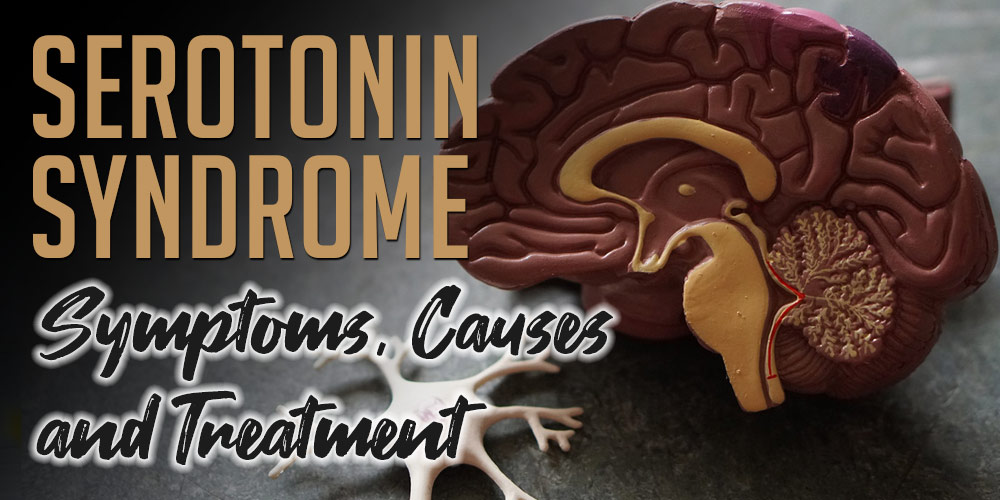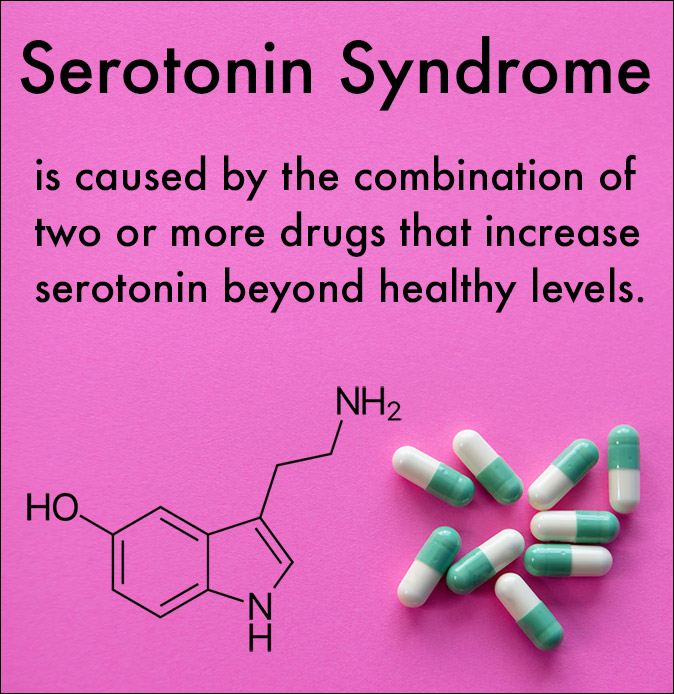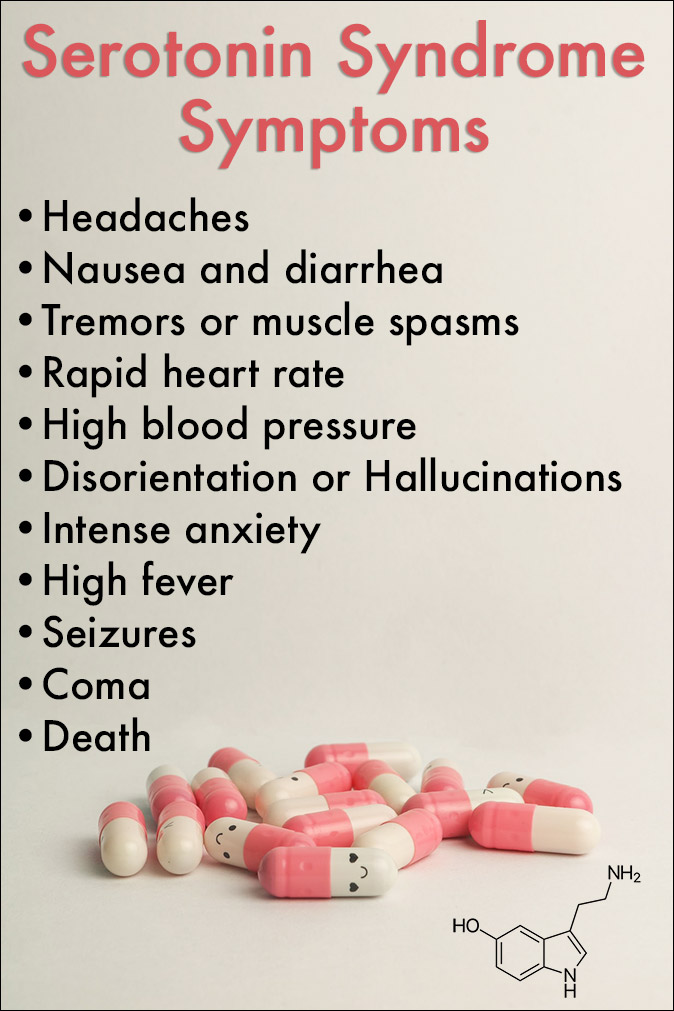
Serotonin Syndrome symptoms are not something many people are familiar with, but anyone taking antidepressant medications or SSRIs for depression or mood disorders should be aware of them.
In the last two decades, serotonin has become a buzzword associated with good health, and for good reason.
Serotonin is a neurotransmitter, or chemical messenger, that is primarily found in the brain, the gut, and blood platelets. It helps cells communicate with each other and regulates functions like mood, attention, blood flow, breathing, digestion and body temp.
Like most things, though, too much of it can be unhealthy and may lead to the dangerous and unhealthy condition known as serotonin syndrome.
What is Serotonin Syndrome?
In its simplest terms, serotonin syndrome is an excess of serotonin in the body and is a potentially serious condition that can cause a broad range of symptoms, from mild to severe.
It is also known as “serotonin toxicity” and can be fatal if not diagnosed early or treated properly.
Serotonin syndrome symptoms can lead to physical and mental issues and severely impact a person’s brain and muscles, as well as other parts of the body.

Serotonin Syndrome Causes
Serotonin Syndrome can be caused by a number of different factors and will impact each person differently.
Contributing Causes of Serotonin Syndrome
- Medications
- Drug interactions
- Overdose
- Illicit drug use
- Herbal supplements
In many cases, serotonin syndrome is caused by the use of medications that increase serotonin levels, or a combination of two or more drugs that boost levels of this neurotransmitter in the body beyond healthy levels.
For example, prescription antidepressant medications, such as selective serotonin reuptake inhibitors (SSRIs), increase serotonin production and raise the levels throughout the body.
According to the Cleveland Clinic Journal of Medicine, approximately 15% of SSRI overdoses lead to mild or moderate serotonin toxicity.
Commonly Prescribed SSRIs Include:
- Zoloft (Sertraline)
- Lexapro (Escitalopram)
- Prozac (Fluoxetine)
- Celexa (Citalopram)
- Paxil (Paroxetine)
When these are combined with other prescription medications like some antibiotics or migraine medicines, it can lead to unhealthy or toxic levels of serotonin in the body.
Other problematic drug interactions can be caused by taking Serotonin Norepinephrine Reuptake Inhibitors (SNRI), Monoamine Oxidase Inhibitors (MAOI), pain medications like Tramadol, or even herbal supplements such as St. John’s Wort.
It’s important to note that mixing serotonin boosting prescription drugs with illicit drugs can also cause this condition.
Illegal drugs, such as LSD, MDMA (ecstasy), cocaine, and methamphetamine all cause a surge of serotonin as well. If a person using these drugs regularly takes antidepressants or other medications that also increase serotonin, the combination can be especially dangerous and lead to more serious symptoms.
In fact, taking too many of the illegal drugs listed, or in combination with each other can also elicit serotonin toxicity.
Mixing drugs like lexapro and marijuana probably won’t cause serotonin syndrome symptoms but may lead to other unhealthy side effects.
Serotonin Syndrome Symptoms
As stated above, the symptoms of serotonin syndrome can range from mild to severe, but even mild symptoms can be particularly dangerous.
Common serotonin syndrome symptoms can include some of the following:
- Headaches
- Feeling agitated or restless
- Nausea and diarrhea
- Heavy sweating or goose bumps
- Tremors, shivering or twitching
- Severe muscle spasms or muscle stiffness
- Rapid heart rate
- High blood pressure
- Dilated pupils
- Disorientation or confusion
- Intense anxiety, irritability or agitation
- Hallucinations
Severe serotonin syndrome symptoms include:
- Irregular heartbeat
- High fever
- Seizures
- Loss of consciousness
- Coma
- Death

Serotonin Syndrome Treatment
Serotonin Syndrome treatment involves several approaches to manage the symptoms and effectively address the underlying causes.
Serotonin Syndrome Treatment Methods
- Discontinuing the medications that caused the symptoms
- Supportive care
- Medications to stabilize serotonin syndrome symptoms
- Hospitalization
Diagnosing serotonin syndrome symptoms is not always easy because there is not a straightforward laboratory test to diagnose it.
A study published on the National Library of Medicine website and updated in July 2020 says, “The true incidence of serotonin syndrome is unknown, most likely because mild cases are frequently overlooked or dismissed. Even more serious cases may frequently be attributed to other causes.”
The best approach for diagnosis of this condition is to speak openly with your physician about any and all drugs, recreational and prescribed, that you take.
Most likely, your doctor will order some blood work to rule out any other issues causing symptoms, but once a diagnosis of serotonin toxicity is confirmed, treatment approaches will vary based on the severity of the condition.
For mild cases, serotonin syndrome treatment might simply involve stopping the serotonin boosting drugs or medications.
However, severe serotonin syndrome symptoms can require hospitalization so physicians can monitor the patient and provide supportive care.
This includes intravenous fluids for dehydration, managing a high body temperature, agitation, and muscle rigidity.
It might also be necessary to take other medications that block the production of serotonin. Benzodiazepines can be used to calm symptoms of anxiety related to the condition.
Other medications may be necessary to regulate heart rate, blood pressure, and control seizures.
Avoiding the Health Risks of Too Much Serotonin
The best way to avoid serotonin syndrome symptoms is to avoid misusing prescribed medications or illegal drugs that can lead to excess serotonin production, or combining substances that boost levels of the neurotransmitter.
Speak with your doctor or pharmacist about any drugs you’re currently taking and how they might interact with any new medications being prescribed.
It is especially dangerous to engage in recreational drug use when taking any medications that increase or control levels of serotonin in the body.
For anyone that deals with substance abuse issues and is prescribed antidepressant medications or other drugs to improve mood, it’s crucial to be brutally honest with your doctor and let them know what types of drugs you might be taking.
This is necessary to avoid dangerous drug interactions.
What to Do If Symptoms Appear
If serotonin syndrome symptoms appear, stop taking any drugs or medications that could be causing an issue.
It’s imperative to consult a healthcare professional immediately as it is a serious medical condition that demands timely recognition and treatment.
For those concerned about the possible negative health impact from taking antidepressants or mood-enhancing prescription medications, there are a variety of serotonin foods that increase serotonin naturally to improve mood.
As with most mood disorders, a regular routine of exercise, proper diet, and restful sleep can do wonders for staying mentally healthy.
Related Posts
- Alcohol Dementia Causes, Symptoms and Treatment
Note: Alcohol Dementia goes by many names including, alcohol-related dementia, alcoholic dementia, and alcohol-induced dementia.…
- Histrionic Personality Disorder Symptoms, Causes, Treatment
The general public often misunderstands personality disorders. These are complex mental illnesses that might present…
- Alcoholic Neuropathy Symptoms, Causes and Treatment
Excessive alcohol consumption, especially for long-term drinkers, can create a host of difficult health issues.…
